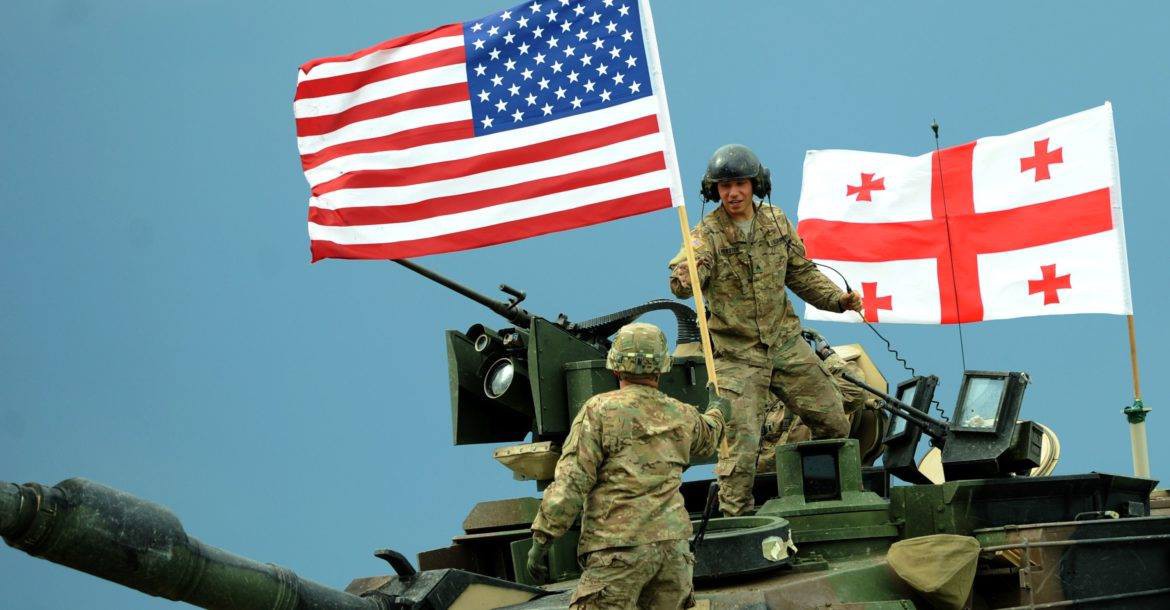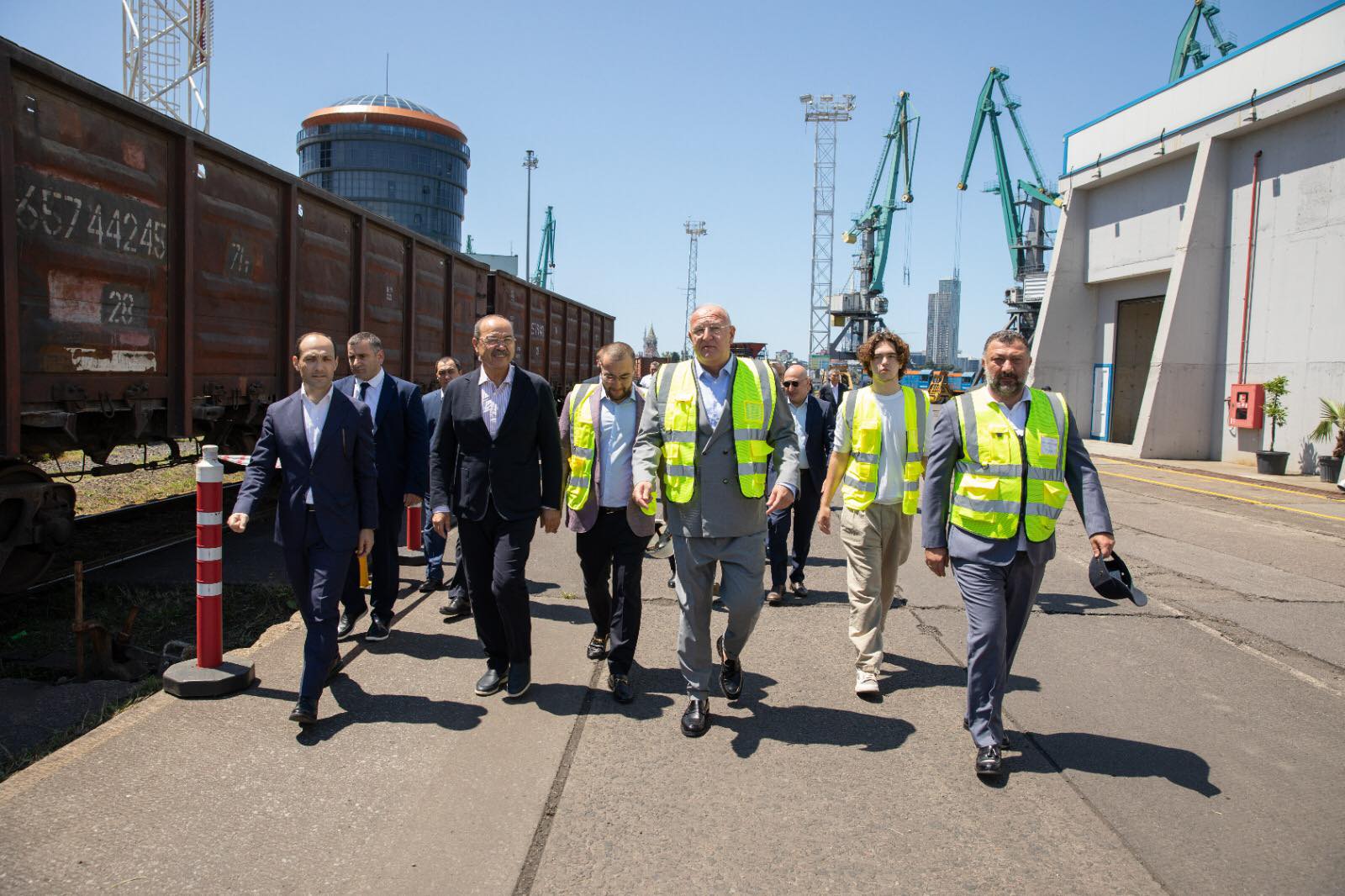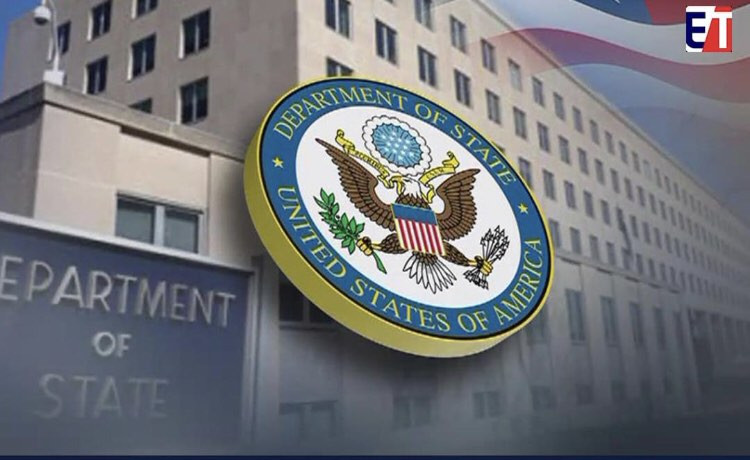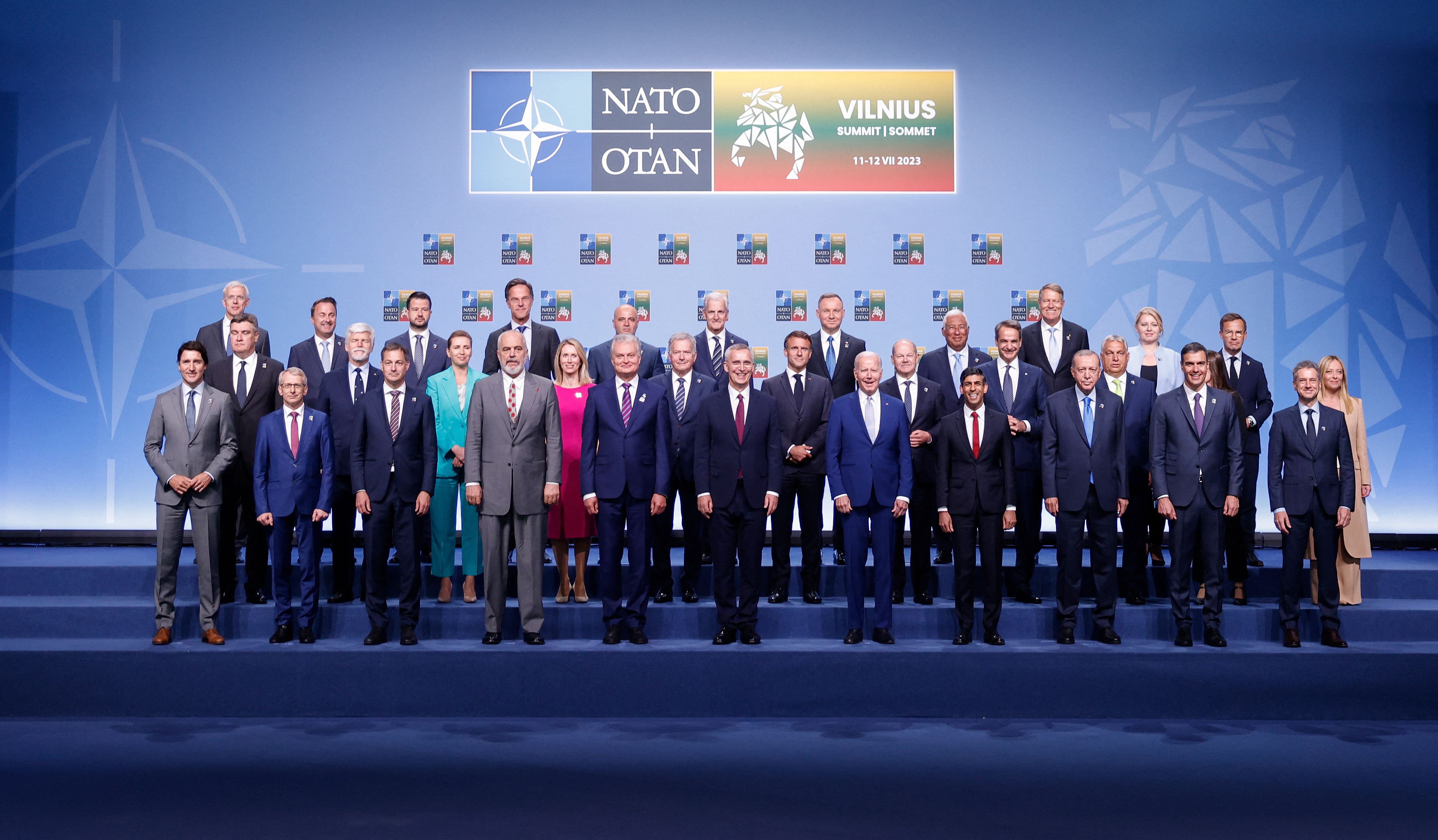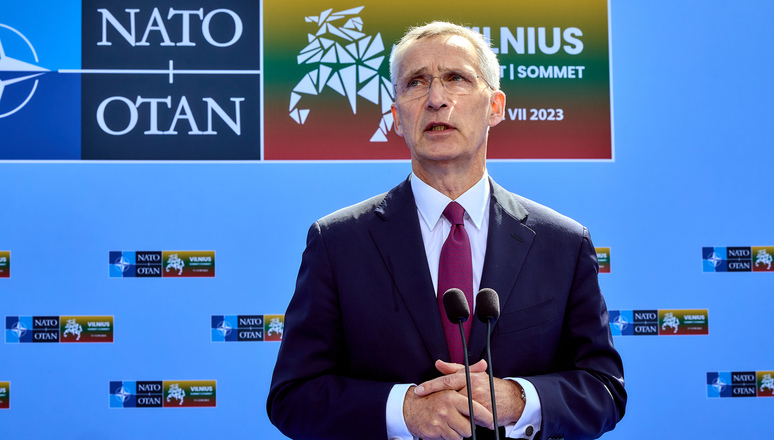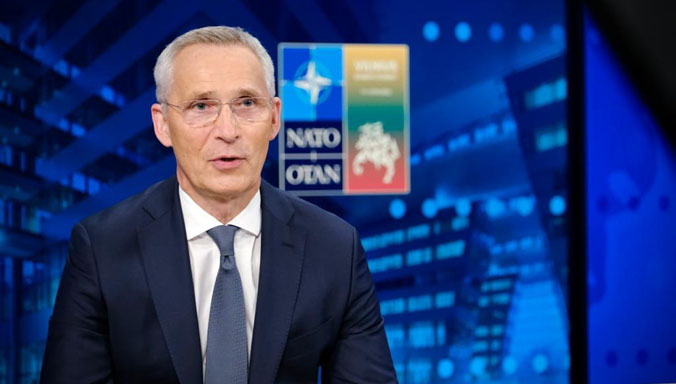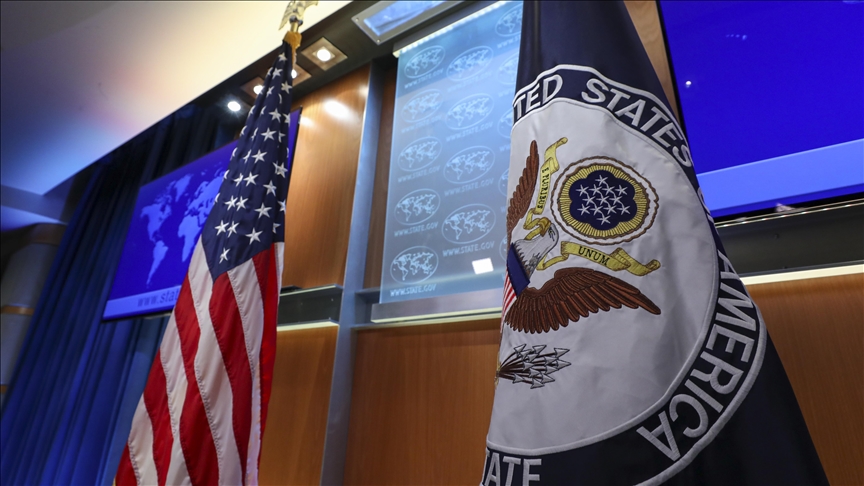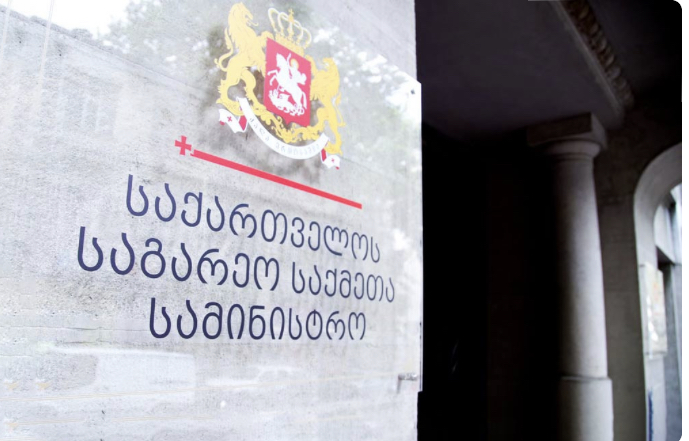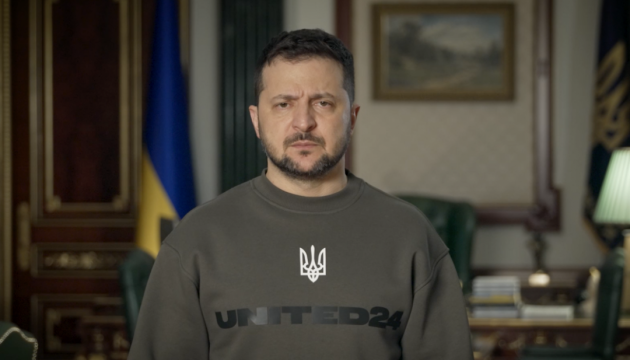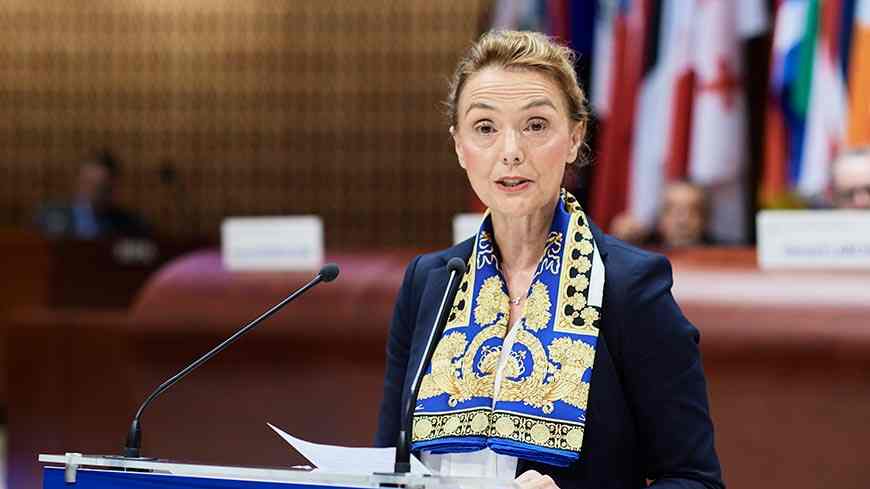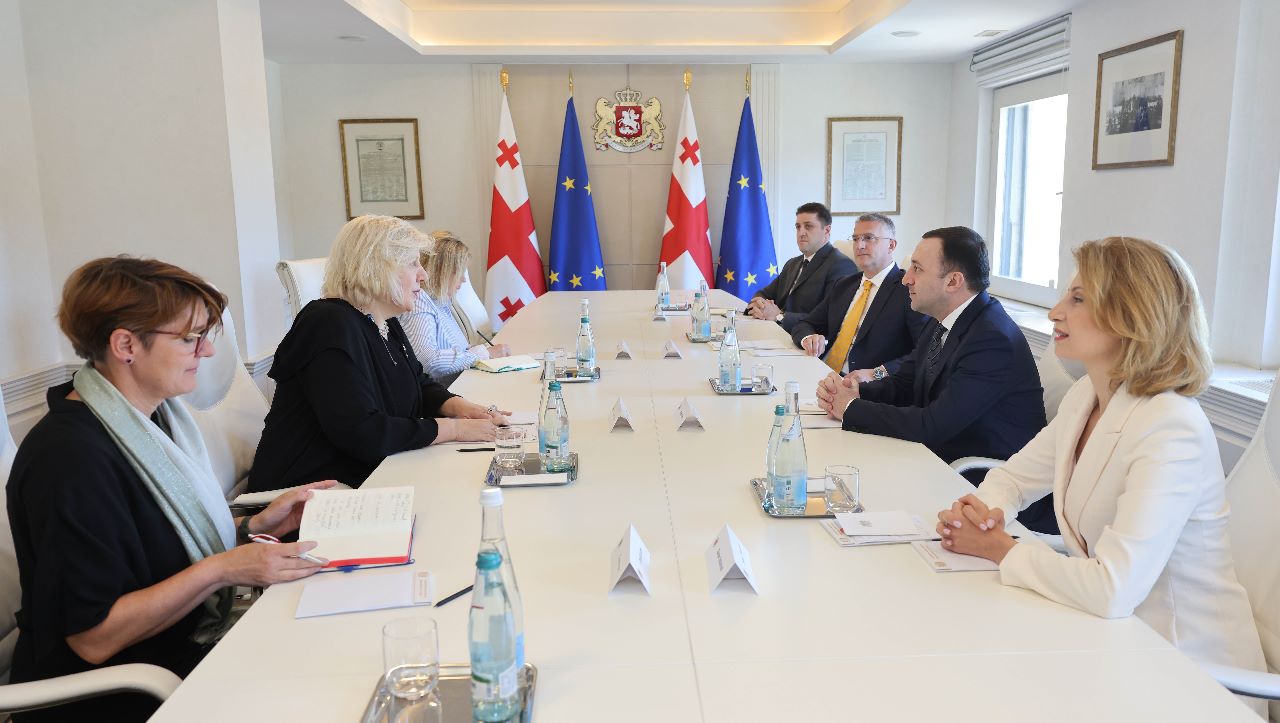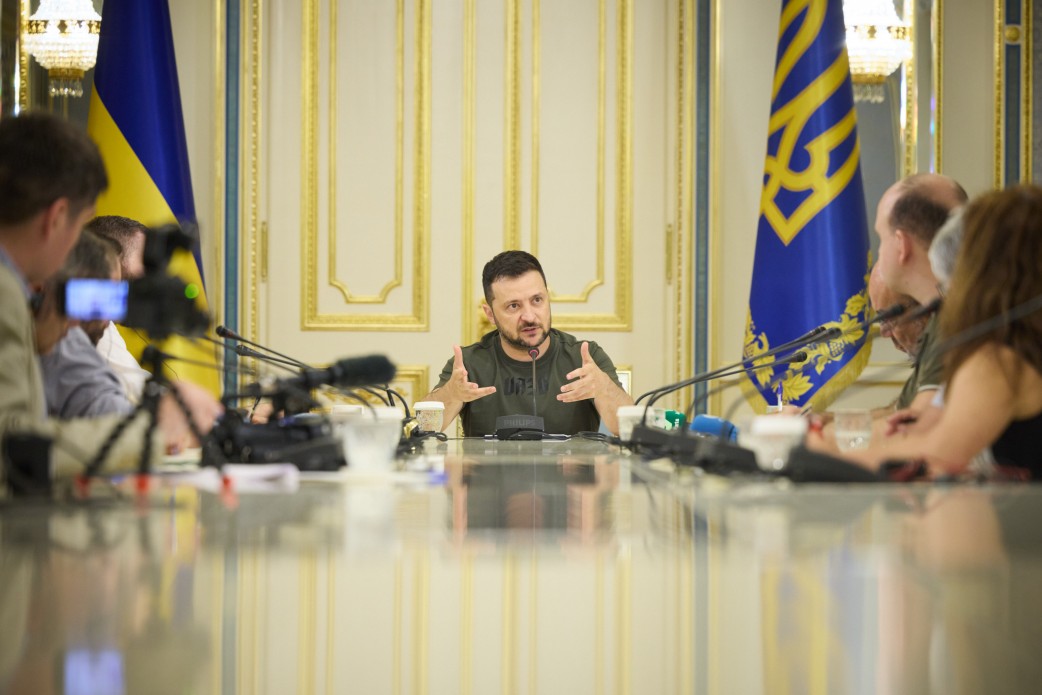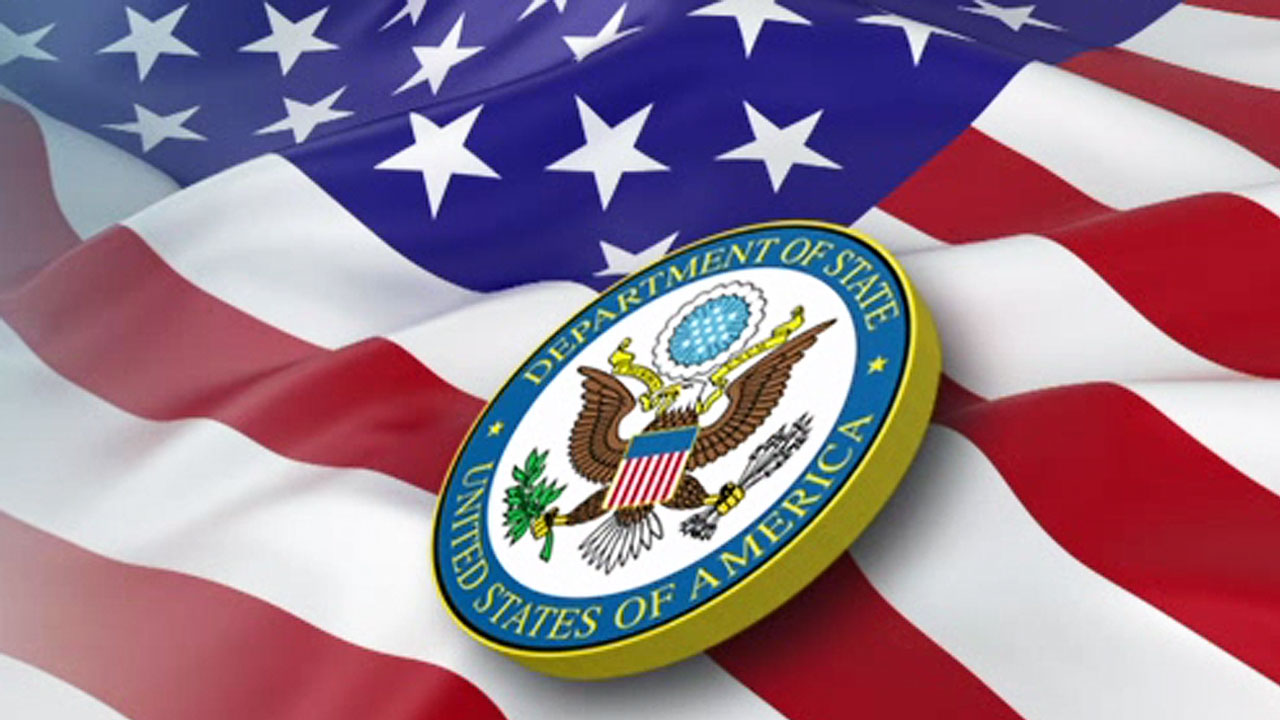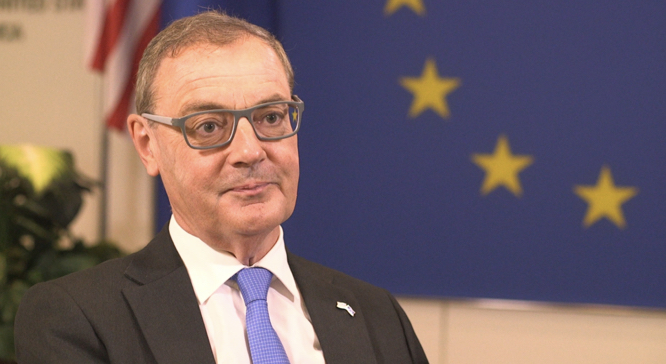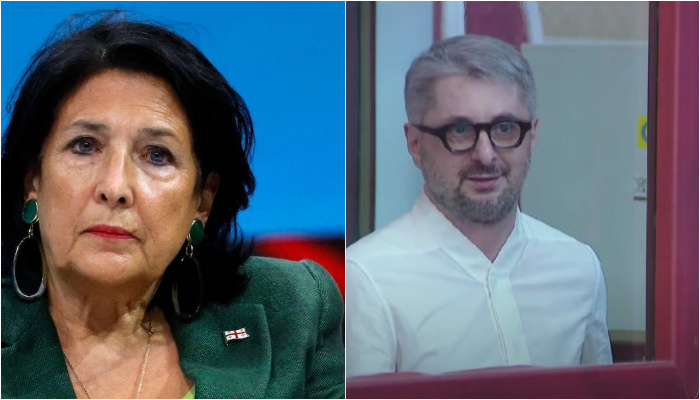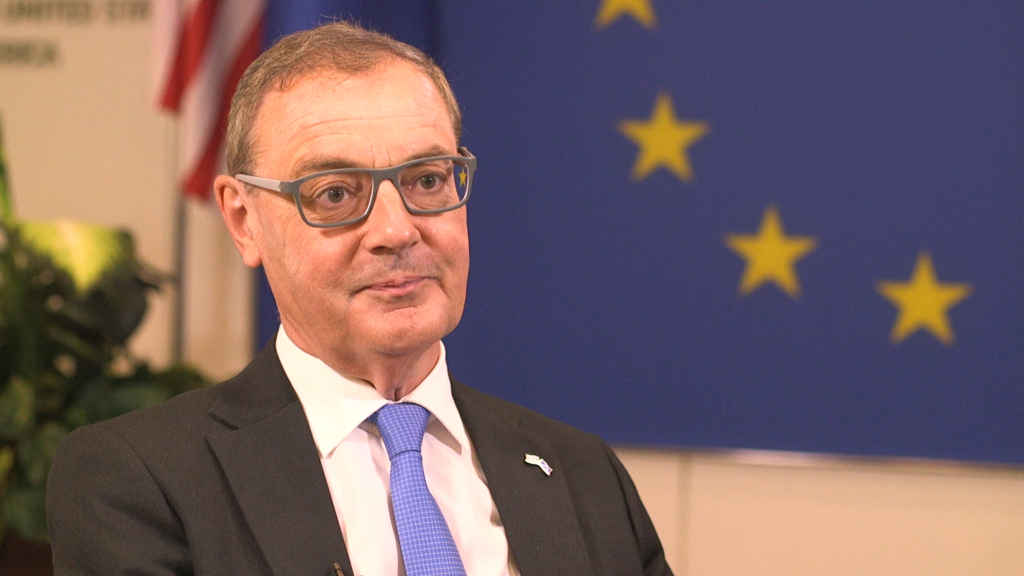news
Georgia takes part in the Combined Resolve Exercise that the U.S. Army Europe and Africa holds with its allies and partners in Germany
The U.S. Army, along with Allies and Partners, will conduct Combined Resolve 18 from April 21 to May 23, 2023, at the Joint Multinational Readiness Center near Hohenfels, Germany. Combined Resolve is a recurring exercise designed to prepare a U.S. Armored Brigade Combat Team in support of NATO deterrence initiatives such as bolstering readiness, responsiveness, and reinforcement. More than 4,000 participants from the U.S. and Allied and Partner nations are scheduled to participate in the exercise. To support this exercise, military vehicles will also use public roads to convoy as part of the exercise during both daylight and evening hours. Due to their size and weight, these vehicles will move slowly and have limited visibility. Drivers are advised to use caution when driving near military convoys. „The Georgia Defense Force (GDF) has 43 soldiers participating in Combined Resolve 18. The infantry platoon from the GDF is attached to the U.S. Army's 1st Battalion, 4th Infantry Regiment (1-4 IN). 1-4 IN also has soldiers from Kosovo, Lithuania, Moldova, North Macedonia, Romania, Slovenia and the United Kingdom in the exercise. The GDF platoon, as a part of 1-4 IN, will train against 2nd Armored Brigade, 1st Cavalry Division (2/1 CD) in the exercise. 2/1 CD is a U.S. Army unit out of Fort Hood, Texas and is deployed to Europe as part of a regular rotation of forces to support the United States’ commitment to Atlantic Resolve. During the exercise 2/1 CD has units from Albania, Azerbaijan, Belgium, Italy, Kosovo, Romania and Slovakia attached to it. Both 2/1 CD and 1-4 IN will conduct on offense and defensive operations against each other during the training. Combined Resolve 18 allows the GDF soldiers an opportunity to train alongside partner nations in a dynamic and realistic training environment provided by U.S. Army at the Joint Multinational Readiness Center, near Hohenfels, Germany. All participants will train on their tactical skills, but the exercise also provides a unique ability for them to integrate with other nations, experiencing the challenges associated with interoperability. Interoperability is the ability of soldiers and systems from other countries to operate in conjunction with each other. Combined Resolve 18 tests the GDF and all countries to overcome challenges based differences in logistics, mission command, communications, equipment, tactics, military culture, and language. All participants evaluate their personnel, training, and equipment to ensure they meet any mission their country requires of them. As one of NATO's closest allies, the U.S. is committed to strengthening Georgia’s security and ability to contribute to international security operations. The U.S. Army's multinational exercises, like Combined Resolve 18, strengthen our countries' capabilities, interoperability, and fosters trust between all participating nations and their militaries“, - Major John Ambelang, the U.S. Army’s media representative for Combined Resolve 18, told Europetime.
Wondernet Express Investment Group has hosted the Prime Minister of the Republic of Uzbekistan, Abdulla Aripov
Wondernet Express Investment Group had the honor of hosting the Prime Minister of the Republic of Uzbekistan – Mr. Abdulla Aripov and the Vice-Prime Minister, Minister of Economy and Sustainable Development of Georgia - Mr. Levan Davitashvili on July 18, 2023. The founder of the company – Mr. Dimitri Abduselishvili and the General Director & CEO – Mr. Mamuka Murjikneli introduced the Batumi Fertilizer Terminal and its working process to the guests of honor. Also, they discussed the importance of the logistics corridor and ways of its further development.
The United States supports Georgia’s NATO aspirations and urges Georgian officials to advance the vital democratic reforms that are essential for NATO accession
The United States supports Georgia’s NATO aspirations. The United States continues to work with Georgia on building its interoperability with NATO and to urge Georgian officials to advance the vital democratic reforms that are essential for NATO accession. A State Department spokesperson told Europetime. "Since taking office, the Biden Administration has prioritized restoring American leadership on the world stage and revitalizing our alliances, including by strengthening NATO. Thanks in part to his leadership, NATO is stronger and more united than it has been in decades. He looks forward to showcasing that unity in July at the Vilnius Summit. Georgia is a steadfast NATO Enhanced Opportunities Partner, a category reserved for NATO’s closest partners, and has served alongside American and other NATO troops. The United States supports Georgia’s NATO aspirations. The United States continues to work with Georgia on building its interoperability with NATO and to urge Georgian officials to advance the vital democratic reforms that are essential for NATO accession, " a State Department spokesperson told Europetime. In July, NATO Leaders will meet to address the most pressing challenges for the Alliance, further strengthen NATO's deterrence and defence and bring Ukraine closer to the Alliance. Previewing the Vilnius Summit at NATO Headquarters on Friday (7 July 2023), Secretary General Jens Stoltenberg said that the meeting of Allied leaders “will send a clear message: NATO stands united, and Russia’s aggression will not pay.” “I expect Allied leaders will agree a package with three elements, to bring Ukraine closer to NATO,” said Mr Stoltenberg. The package will include a multi-year programme of assistance to ensure interoperability; upgraded political ties – with President Zelenskyy attending the inaugural meeting of a new NATO-Ukraine Council; and a reaffirmation that Ukraine will become a member of NATO, with unity on how to bring Ukraine closer to its goal. Allies will also take major steps to strengthen deterrence and defence, with the adoption of three new regional defence plans to counter the two main threats to NATO: Russia and terrorism. The plans will be supported by 300,000 troops on higher readiness, including substantial air and naval combat power. Allies are also expected to endorse a Defence Production Action Plan to “aggregate demand, boost capacity, and increase interoperability” and a more ambitious defence investment pledge to invest a minimum of 2% of Gross Domestic Product annually on defence. The Secretary General welcomed that NATO’s new defence spending estimates, released today, show a real increase of 8.3% for European Allies and Canada in 2023. "This is the biggest increase in decades, and the ninth consecutive year of increases in our defence spending," said the Secretary General. "So European Allies and Canada will have invested over 450 billion extra US dollars since we agreed our defence investment pledge in 2014." The leaders of Australia, New Zealand, Japan and South Korea, as well as the European Union, will also take part in the Vilnius Summit. This will be Finland’s first Summit as a NATO Ally, the Secretary General noted, adding: “we look forward to Sweden joining as soon as possible.” Following a constructive meeting of senior officials from Türkiye, Sweden and Finland on Thursday, Mr Stoltenberg will meet with President Erdogan and Prime Minister Kristersson in Vilnius on 10 July, as the next step. At the Vilnius Summit, the allies will reiterate support for Georgia’s territorial integrity and sovereignty within its internationally recognized borders, said NATO Secretary General Jens Stoltenberg at the press conference in Brussels. „Well, our message has been for a long time – and was reiterated at a previous Summit – that we need to strengthen our partnership with partners that are vulnerable for Russian interference and under pressure. At the Summit, Allies will reiterate our support to the territorial integrity and sovereignty of Georgia within its internationally recognised borders. Allies will also, I expect, reaffirm Georgia’s right to decide its own future and foreign policy, free from outside intervention.Therefore, we call on Russia to withdraw its forces it has in Georgia – without any consent from the Georgian government – and to end its recognition and militarisation, of course, and South Ossetia. And I think, also, we have to recognise, once again, the importance that Georgia plays in also strengthening the partnership between NATO and Georgia, and the commitment to Euro-Atlantic security. So we will address also other partners than Ukraine. Of course, Ukraine will be at the top of the agenda, because there’s a full-fledged war taking place in Ukraine, but we will also address the importance of strengthening our partnership with a country like Georgia.“
U.S. Mission on the 58th round of GID: The United States called upon the Russian Federation, to withdraw its forces to pre-conflict positions
The United States notes the conclusion of the 58th round of the Geneva International Discussions (GID) on the Conflict in Georgia, which took place in Geneva on July 11–12th. The United States delegation, led by Advisor for Caucasus Negotiations Louis Bono, welcomed dialogue with participants seeking a peaceful resolution to the conflict in Georgia. The United States called upon the Russian Federation, as a party to the conflict, to fulfill immediately its clear obligation under the EU-mediated August 12, 2008, ceasefire agreement to withdraw its forces to pre-conflict positions, as well as to uphold its commitments to allow unfettered access for the delivery of humanitarian assistance and not to impede the creation of international security arrangements on the ground. According to the statement, the occupation of 20 percent of Georgia’s territory by Russia’s forces undermines Georgia’s sovereignty and territorial integrity, as does Russia’s ongoing borderization. The United States applauds Georgia’s long-held commitment not to use force to resolve the conflict. "The United States condemns, in the strongest possible terms, Russia’s unprovoked war against Ukraine, even as Russia continues to violate Georgia’s sovereignty and territorial integrity. Russia is the only party to the conflict in Georgia that currently stations its forces on the territory of another sovereign state, in flagrant violation of international law and its obligations under the 2008 ceasefire agreement. The United States regrets that, due to a walk-out by participants from Russia and the de facto authorities, the issues of Internally Displaced Persons and refugees, water, and gas could not be fully discussed. The United States welcomes the ongoing Ergneti Incident Prevention and Response Mechanism (IPRM), which defuses tensions and improves living conditions at the local level, and the United States hopes to see the resumption of the Gali IPRM. The United States notes the partial reopening of two crossing points on the administrative boundary line with the South Ossetia region of Georgia, and we continue the call for their full reopening, which would have a positive impact for communities in conflict-affected areas", - the statement reads.
German ambassador: We will deepen our co-operation with friendly countries like Georgia so that they can protect their security and sovereignty
Peter Fischer, the German ambassador to Georgia, commented with Europetime about the importance of the Vilnius Summit for Georgia and other close allies. „The summit will demonstrate NATO's strong unity to defend our territory and support the resilience of countries like Georgia. We welcome new members like Finland and, very soon, Sweden. We will establish an enhanced support structure for Ukraine. And we will deepen our co-operation with friendly countries like Georgia so that they can protect their security and sovereignty," the German ambassador told Europetime. On July 11–12, NATO Leaders will meet to address the most pressing challenges for the Alliance, further strengthen NATO's deterrence and defence and bring Ukraine closer to the Alliance. Previewing the Vilnius Summit at NATO Headquarters on Friday (7 July 2023), Secretary General Jens Stoltenberg said that the meeting of Allied leaders “will send a clear message: NATO stands united, and Russia’s aggression will not pay.” “I expect Allied leaders will agree a package with three elements, to bring Ukraine closer to NATO,” said Mr Stoltenberg. The package will include a multi-year programme of assistance to ensure interoperability; upgraded political ties – with President Zelenskyy attending the inaugural meeting of a new NATO-Ukraine Council; and a reaffirmation that Ukraine will become a member of NATO, with unity on how to bring Ukraine closer to its goal. Allies will also take major steps to strengthen deterrence and defence, with the adoption of three new regional defence plans to counter the two main threats to NATO: Russia and terrorism. The plans will be supported by 300,000 troops on higher readiness, including substantial air and naval combat power. Allies are also expected to endorse a Defence Production Action Plan to “aggregate demand, boost capacity, and increase interoperability” and a more ambitious defence investment pledge to invest a minimum of 2% of Gross Domestic Product annually on defence. The Secretary General welcomed that NATO’s new defence spending estimates, released today, show a real increase of 8.3% for European Allies and Canada in 2023. "This is the biggest increase in decades, and the ninth consecutive year of increases in our defence spending," said the Secretary General. "So European Allies and Canada will have invested over 450 billion extra US dollars since we agreed our defence investment pledge in 2014." The leaders of Australia, New Zealand, Japan and South Korea, as well as the European Union, will also take part in the Vilnius Summit. This will be Finland’s first Summit as a NATO Ally, the Secretary General noted, adding: “we look forward to Sweden joining as soon as possible.” Following a constructive meeting of senior officials from Türkiye, Sweden and Finland on Thursday, Mr Stoltenberg will meet with President Erdogan and Prime Minister Kristersson in Vilnius on 10 July, as the next step. At the Vilnius Summit, the allies will reiterate support for Georgia’s territorial integrity and sovereignty within its internationally recognized borders, said NATO Secretary General Jens Stoltenberg at the press conference in Brussels. „Well, our message has been for a long time – and was reiterated at a previous Summit – that we need to strengthen our partnership with partners that are vulnerable for Russian interference and under pressure. At the Summit, Allies will reiterate our support to the territorial integrity and sovereignty of Georgia within its internationally recognised borders. Allies will also, I expect, reaffirm Georgia’s right to decide its own future and foreign policy, free from outside intervention.Therefore, we call on Russia to withdraw its forces it has in Georgia – without any consent from the Georgian government – and to end its recognition and militarisation, of course, and South Ossetia. And I think, also, we have to recognise, once again, the importance that Georgia plays in also strengthening the partnership between NATO and Georgia, and the commitment to Euro-Atlantic security. So we will address also other partners than Ukraine. Of course, Ukraine will be at the top of the agenda, because there’s a full-fledged war taking place in Ukraine, but we will also address the importance of strengthening our partnership with a country like Georgia.“
Vilnius Summit Communiqué
NATO Heads of State and Government participating in the meeting of the North Atlantic Council in Vilnius have published Vilnius Summit Communiqué, reiterating the 2008 Bucharest Summit decision that “Georgia will become a member of the Alliance with the Membership Action Plan (MAP) as an integral part of the process; we reaffirm all elements of that decision, as well as subsequent decisions.” According to the Communiqué, “to advance its Euro-Atlantic aspirations, Georgia must make progress on reforms, including key democratic reforms, and make best use of the ANP.““We reiterate our support to the territorial integrity and sovereignty of Georgia within its internationally recognised borders. “We stand firm in our support for Georgia’s right to decide its own future and foreign policy course free from outside interference. We call on Russia to withdraw the forces it has stationed in Georgia without its consent. We further call on Russia to reverse its recognition of the Abkhazia and South Ossetia regions of Georgia; to end the militarisation of these regions and continued attempts to forcibly separate them from the rest of Georgia through the construction of border-like obstacles; and to cease the human rights violations and abuses, including arbitrary detentions, and harassments of Georgian citizens. We highly appreciate Georgia’s substantial contributions to NATO operations, which demonstrate its commitment and capability to contribute to Euro-Atlantic security. We remain committed to making full use of the NATO-Georgia Commission and the Annual National Programme (ANP) in deepening political dialogue and practical cooperation with Georgia. We reiterate the decision made at the 2008 Bucharest Summit that Georgia will become a member of the Alliance with the Membership Action Plan (MAP) as an integral part of the process; we reaffirm all elements of that decision, as well as subsequent decisions. We welcome the progress made in implementing the enhanced Substantial NATO-Georgia Package, including Crisis Management, Cyber Security, Military Engineering, and Secure Communications, as well as new initiatives in the areas of Chemical, Biological, Radiological, and Nuclear (CBRN) Defence and Training Facilities. To advance its Euro-Atlantic aspirations, Georgia must make progress on reforms, including key democratic reforms, and make best use of the ANP.” According to the Vilnius Summit Communique, Russia bears full responsibility for its unjustified and unprovoked war of aggression against Ukraine, which is a blatant violation of international law and the basic principles of the UN Charter. "Russia bears full responsibility for its illegal, unjustifiable, and unprovoked war of aggression against Ukraine, which has gravely undermined Euro-Atlantic and global security and for which it must be held fully accountable. We continue to condemn in the strongest terms Russia's blatant violations of international law, the Charter of the United Nations, and OSCE commitments and principles. We do not and will never recognize Russia's illegal and illegitimate annexations, including Crimea," the document reads. NATO leaders stressed that there can be no impunity for Russian war crimes and other atrocities, such as attacks against civilians and the destruction of civilian infrastructure that deprives millions of Ukrainians of basic human services. All those responsible must be held accountable for violations and abuses of human rights and international humanitarian law, particularly against Ukraine’s civilian population, including the forced deportation of children and conflict-related sexual violence. "The destruction of the Kakhovka dam highlights the brutal consequences of the war started by Russia. Russia's war has had a profound impact on the environment, nuclear safety, energy and food security, the global economy, and the welfare of billions of people around the world. Allies are working to enable exports of Ukrainian grain and actively support international efforts to alleviate the global food crisis," the communique reads. A two-day NATO summit began in Vilnius on Tuesday, July 11. The main topics on the agenda are the strengthening of the Alliance's deterrence and defense system, continued assistance to Ukraine, as well as the issue of bringing Ukraine closer to NATO membership.
Ukraine will be invited to NATO when allies agree and conditions are met - Stoltenberg
The heads of state and government of NATO member countries have agreed to remove the requirement for a Membership Action Plan (MAP) for Ukraine and said they would issue an invitation for Ukraine to join the military alliance when allies agree and conditions are met. NATO Secretary General Jens Stoltenberg said this at a press conference in Vilnius on Tuesday, July 11, after the meeting of the North Atlantic Council at the level of heads of state and government. "We reaffirmed that Ukraine will become a member of NATO and agreed to remove the requirement for a Membership Action Plan. This would change Ukraine's membership path from a two-step process to a one-step process. We also made clear that we will issue an invitation for Ukraine to join NATO when allies agree and conditions are met," Stoltenberg said. According to him, this decision is part of a package of three elements agreed by Allies "to bring Ukraine closer to NATO." Stoltenberg said that another element is "a new multi-year assistance program for Ukraine to enable the transition from Soviet-era to NATO standards, training and doctrines, to help rebuild Ukraine's security and defense sector and to cover critical needs like fuel, de-mining equipment and medical supplies." According to him, this decision is part of a package of three elements agreed by Allies "to bring Ukraine closer to NATO." Stoltenberg said that another element is "a new multi-year assistance program for Ukraine to enable the transition from Soviet-era to NATO standards, training and doctrines, to help rebuild Ukraine's security and defense sector and to cover critical needs like fuel, de-mining equipment and medical supplies." Vilnius Summit Communiqué
Secretary General: Vilnius Summit will make Ukraine stronger, reinforce NATO’s deterrence and defence
Previewing the Vilnius Summit at NATO Headquarters on Friday (7 July 2023), Secretary General Jens Stoltenberg said that the meeting of Allied leaders “will send a clear message: NATO stands united, and Russia’s aggression will not pay.” “I expect Allied leaders will agree a package with three elements, to bring Ukraine closer to NATO,” said Mr Stoltenberg. The package will include a multi-year programme of assistance to ensure interoperability; upgraded political ties – with President Zelenskyy attending the inaugural meeting of a new NATO-Ukraine Council; and a reaffirmation that Ukraine will become a member of NATO, with unity on how to bring Ukraine closer to its goal. Allies will also take major steps to strengthen deterrence and defence, with the adoption of three new regional defence plans to counter the two main threats to NATO: Russia and terrorism. The plans will be supported by 300,000 troops on higher readiness, including substantial air and naval combat power. Allies are also expected to endorse a Defence Production Action Plan to “aggregate demand, boost capacity, and increase interoperability” and a more ambitious defence investment pledge to invest a minimum of 2% of Gross Domestic Product annually on defence. The Secretary General welcomed that NATO’s new defence spending estimates, released today, show a real increase of 8.3% for European Allies and Canada in 2023. "This is the biggest increase in decades, and the ninth consecutive year of increases in our defence spending," said the Secretary General. "So European Allies and Canada will have invested over 450 billion extra US dollars since we agreed our defence investment pledge in 2014." The leaders of Australia, New Zealand, Japan and South Korea, as well as the European Union, will also take part in the Vilnius Summit. This will be Finland’s first Summit as a NATO Ally, the Secretary General noted, adding: “we look forward to Sweden joining as soon as possible.” Following a constructive meeting of senior officials from Türkiye, Sweden and Finland on Thursday, Mr Stoltenberg will meet with President Erdogan and Prime Minister Kristersson in Vilnius on 10 July, as the next step.
State Department: We recognize the opportunities for Georgia to play an important role in connecting Central Asia to Europe through the middle corridor
The United States welcomes a new ferry service between Romania and Georgia. „We recognize the opportunities that these ferry routes create and the opportunities for Georgia to play an important role in connecting Central Asia to Europe through the middle corridor" a State Department spokesperson told Europetime. „The United States has long supported Georgia’s economic development, along with other countries in the Caucasus, Central Asia, and Europe. We recognize the opportunities that these ferry routes create, and the opportunities for Georgia to play an important role in connecting Central Asia to Europe through the middle corridor“, a State Department spokesperson told Europetime. Some background There is now a brand-new ferry service running between Georgia and Romania. On June 27, 2023, the first voyage was place, leaving from the port of Constanta and arriving at the port of Poti after two nights at sea. The ferry service, which transports both people and goods, is run by the Georgian business E60 Shipping. A document establishing the Black Sea-Caspian Sea Freight Transport Corridor was signed in March 2019 by Georgia, Romania, Azerbaijan, and Turkmenistan, creating new opportunities for connectivity and regional development in the area. They stated that this new corridor will be the shortest, most profitable way to connect Central Asia to Europe through the two seas. Read more: The Romanian Ambassador to Georgia welcomes a new ferry service between Romania and Georgia: It strengthens the connection between our countries and the two shores of the Black Sea
Georgian MFA expresses "deep concern" over Zelenskyy’s decision
The Georgian Foreign Ministry expresses “deep concern” at the Ukrainian authorities’ decision to demand that the Georgian ambassador leave within 48 hours for consultations in the capital. The Ministry of Foreign Affairs of Georgia reacted to the earlier statement of Ukrainian President Volodymyr Zelensky, in which he asked the Georgian authorities to transfer Mikheil Saakashvili to Ukraine and ordered the summoning of the Georgian Ambassador to Ukraine. The MFA says: “This action represents an extreme form of escalation of diplomatic relations” and says it is “regrettable” that official Kyiv is taking this step “against a friendly state and people”. The Foreign Ministry’s statement reads reads that “the reasons given by the Ukrainian authorities make this decision particularly incomprehensible”, citing the Strasbourg court ruling which “put an end to speculation about the health of the convicted Mikheil Saakashvili” and “confirmed the highest standards of protection of Mikheil Saakashvili’s rights by the state”. “Against the background of such developments, the decision of the Ukrainian authorities significantly harms the strategic relations of the two countries and constitutes a direct interference in the internal affairs of a sovereign state,” the statement says, expressing the hope that official Kyiv “will reconsider its decision and make efforts to further develop the historically friendly relations between the two countries”. Recalling Georgia’s support for the territorial integrity and sovereignty of Ukraine and its people, both bilaterally and in the international arena, the MFA notes that Georgia’s diplomatic mission in Ukraine has continued to function even in the most difficult moments, during the ongoing war. The Foreign Ministry says that the Georgian Ambassador Extraordinary and Plenipotentiary to Ukraine has already conveyed Tbilisi’s official position to the Ukrainian side during the meeting held today in Kyiv at the Ministry of Foreign Affairs of Ukraine. The statement reads that “Georgia at this stage refrains from any additional reaction in response to the steps taken by Ukraine”. Ukrainian President Volodymyr Zelenskyy on Monday called on the Georgian authorities to hand over Saakashvili to Ukraine for the “necessary treatment and care” and instructed the Ukrainian foreign office to summon the Georgian Ambassador to Ukraine, to “express our strong protest” and to ask him to leave Ukraine within 48 hours to hold consultations with his capital.
North Atlantic Council extends mandate of the NATO Secretary General
NATO Allies agreed on Tuesday (4 July 2023) to extend the mandate of Secretary General Jens Stoltenberg by a further year, until 1 October 2024. The decision will be endorsed by NATO Heads of State and Government at the Vilnius Summit. Allies thanked the Secretary General for his leadership and commitment, which has been critical to preserving transatlantic unity in the face of unprecedented security challenges. Mr Stoltenberg said: “I am honoured by the decision of NATO Allies to extend my term as Secretary General. The transatlantic bond between Europe and North America has ensured our freedom and security for nearly seventy-five years, and in a more dangerous world, our great Alliance is more important than ever.”
Zelensky asks Georgian envoy to leave Kyiv over jailed ex-president
Ukrainian President Volodymyr Zelensky on Monday asked the Georgian ambassador to Kyiv to leave Ukraine within 48 hours and return to Tbilisi for consultations relating to Mikheil Saakashvili. The court appearance led Ukrainian President Volodymyr Zelenskiy to call for the immediate release of Saakashvili, who is also a Ukrainian citizen. "Right now, Russia is killing Ukrainian citizen Mykhailo Saakashvili at the hands of the Georgian authorities," writes Zelensky on Twitter. "We have repeatedly called on the official Tbilisi to stop this abuse and agree on Saakashvili's return to Ukraine. Our partners, in coordination with Ukraine, have also offered various rescue options. Today, I have instructed the Ministry of Foreign Affairs to summon the Georgian Ambassador to Ukraine, to express our strong protest and to ask him to leave Ukraine within 48 hours to hold consultations with his capital. Once again, I call on the Georgian authorities to hand over Ukrainian citizen Mykhailo Saakashvili to Ukraine for the necessary treatment and care. And I urge our partners to address this situation and not ignore it and save this man. No government in Europe has the right to execute people, life is a basic European value," Volodymyr Zelensky tweeted. “You should apologize to the MEPs, to my family, to me, to the state of Ukraine, whose citizen you brought to this condition, and to all Georgians, for putting the founder of the Georgian state in this state, Papuashvili, look at me carefully!“ - the former president of Georgia, Mikheil Saakashvili, said during his remote participation in the court session.While making the said statement, he stood up and demonstrated his physical condition. According to him, all those who betrayed Georgia and Ukraine should be subjected to the strictest sanctions. Saakashvili, who was Georgia’s president from 2004 to 2013, is serving a six-year sentence for abuse of power, a charge that he and his supporters say was politically motivated. He is currently on trial on separate charges of violently dispersing an antigovernment rally in November 2007 and illegal border crossing.
Australia legalises psychedelics for mental health
Australia has become the first country in the world to legalise the use of psychedelics to treat some mental health conditions. According to the BBC Approved psychiatrists can now prescribe MDMA to those suffering post-traumatic stress disorder and magic mushrooms for some types of depression. The controversial move has been hailed as a game-changer by many scientists and mental health experts. However, others say the move has been too hasty and should not be over-hyped. Experts say there is still the risk of a "bad trip", which is when the user has an unpleasant experience while under the influence of drugs. And the therapy comes at a cost, with Australian media reporting one course could cost tens of thousands of dollars. MDMA - also known as the party drug ecstasy - is a synthetic drug that acts as a hallucinogen. It increases the user's energy levels, sensory experiences and distorts their sense of time. Magic mushrooms, which grow naturally, also have hallucinogenic effects due to the active compound psilocybin. While Australia is the first country in the world to regulate the drugs as medications, clinical trials are also underway in the US, Canada and Israel. Under the new regulations which became official in Australia on 1 July, approved psychiatrists can prescribe MDMA for post-traumatic stress disorder (PTSD) and psilocybin for depression that has resisted other treatments. Use of the psychedelics would be carefully monitored and not a case of "take a pill and go away", said Dr Mike Musker, a mental health researcher at the University of South Australia. Describing the move as a "game-changer", he told AFP news agency that, in the case of MDMA for example, the patient would likely have three treatments over five to eight weeks. Each treatment would last about eight hours, with the therapist staying with the patient the whole time. Patients should not expect a miracle cure, however. "I have read about stories where people have had what you call bad trips, or actually they've re-experienced their trauma, and so we've got to take great caution," Dr Musker said. Professor Susan Rossell, a cognitive neuropsychologist at Melbourne's Swinburne University said that while psychedelics certainly had the potential for therapeutic use, the move had come about too quickly. "When you look at interventions... for any other kind of disease, whether it's cardiovascular disease or cancer, you cannot get a drug to market as quickly as this has been done," she told AFP. Prof Rossell, who is leading Australia's biggest trial on the effects of psilocybin on depression, added that more research was needed to determine the long-term outcomes of the therapy. Australia's Therapeutic Goods Administration (TGA) shocked many in the medical and science world in February when it reclassified MDMA and psilocybin so they could be used for therapeutic purposes. It declared the drugs "relatively safe" when used in a "medically-controlled environment" for patients "with serious mental health conditions". Otherwise, both MDMA and psilocybin are illegal in Australia. The TGA acknowledges that there are unknowns and inconclusive evidence, but says "there are promising signs" that controlled therapeutic use of the drugs may improve mental health for some people and that the "benefits for some patients... will outweigh the risks". The regulator says there are currently no approved products that contain MDMA or psilocybin. However the reclassification means psychiatrists will be able to access and legally supply certain medicines that contain them, even if they have not been evaluated for safety or effectiveness.
The Secretary General of the Council of Europe says Russia must abide by the rulings rendered by the European Court of Human Rights in the case of "Georgia v. Russia
The Secretary General of the Council of Europe has stated that Russia must abide by the rulings rendered in the "Georgia v. Russia" case by the European Court of Human Rights. She also spoke about the Russia-Ukraine war and noted that Russia's illegal aggression against Ukraine is the result of its separation from the values of the Council of Europe. "It is because of this that Russia was expelled from the Council of Europe, and it is because of this that we are doing everything we can to support Ukraine," said Marija Pejčinović Burić. „Allow me to speak a few words about the important issue of the implementation of the decision of the European Court of Human Rights in the interstate case of "Georgia v. Russia". These decisions will continue to be discussed in the Committee of Ministers, and the Russian Federation remains obliged to implementing them. Due to non-payment of the amount imposed by the court in connection with the lawsuit against Russia, the fine continues to increase and currently exceeds 10 million euros. There is also a second judgment that begins with an execution, Georgia v. Russia. I can assure you that we will continue to work diligently. According to the international law, Russia is obliged to implement the decisions, we will insist on this at every meeting where this case is discussed," Marija Pejčinović Burić. According to her, the cooperation between the Council of Europe and Georgia is strong. "Our current action plan, which ends at the end of this year, has supported your government in making progress on many reforms, such as the fight against corruption, the reform of the judiciary, media legislation, the fight against violence against women and the sexual exploitation of children. A new action plan for the next period 2024-2027 is being developed and I hope it will be finished soon, so I can assure you that the Council of Europe will faithfully advise you to continue supporting these reforms, which are also an instrument in your pursuit of the EU. The Council of Europe also remains unwavering towards the sovereignty and territorial integrity of Georgia. We will continue to promote the restoration of trust. We will continue to promote confidence-building measures aimed at building bridges between population groups and strengthening human rights protection in conflict-affected regions. We will also continue to fight for access to the Georgian region, Abkhazia and South Ossetia. According to her, the Council of Europe supports Georgia on its reform path. She expressed hope that the future action plan will be stronger than the current one, because "the need is greater, the ambitions are greater". "We are here to work with you on this," noted Marija Pejčinović Burić. „This is my second visit to Georgia. I'm looking forward to having a very rich program during my visit, including visiting the occupation line, because it's very important to visit those people, because given the diligent work of the report on Georgia every year, I think it's important to visit the people who directly experience it. Let me start by expressing my gratitude to the Government of Georgia for inviting me to the country," said Marija Peičinović Burić. Some background According to Council of Europe Secretary General Marija Pejčinović Burić has met the President and key ministers during an official visit to Georgia. Meeting Georgian President Salomé Zourabichvili, the Secretary General reaffirmed the Council of Europe’s full support to the ongoing reform process, highlighting the strategic value of co-operation to defend values of democracy, rule of law, and human rights in a period in which we witness democratic backsliding across Europe. The exchange also focused on the Secretary General consolidated report on the conflict in Georgia and support the broader reconciliation process through the Confidence-Building Measures (CBMs). Marija Pejčinović Burić will discuss the implementation of the conclusions of the Fourth Summit of the Heads of State and Government with the Prime Minister, the Minister for Foreign Affairs, key Ministers, and the Parliament Chairman. The elaboration of the new Action Plan 2024-2027, which contributes to the country’s aspirations for EU integration, will also been raised. “The co-operation between Georgia and the Council of Europe is strong. Our current Action Plan which ends in 2023 has supported Georgia in advancing many reforms in key areas, such as the fight against corruption, the reform of the judiciary, media legislation, the fight against violence against women and sexual exploitation of children”, emphasised the Secretary General, during a press briefing with the Foreign Minister. According to the Council of Europe the Secretary General will visit the “administrative line“ and participate in the Second Annual Tbilisi Women’s International conference.
The CoE Commissioner for Human Rights visits Georgia
Dunja Mijatović, Council of Europe Commissioner for Human Rights, is on a working visit to Georgia. She has already met Prime Minister Irakli Garibashvili. Mijatovi took part in the Tbilisi Women's International Conference as one of the invited speakers. Additionally, she is anticipated to open Tbilisi Pride Week, which runs from July 1 to July 8. Irakli Garibashvili, the prime minister, and Dunja Mijatovi met on July 1. According to a news release from the government's administration, they talked about the actions done by the Georgian government to improve national structures for defending human rights. During the meeting, PM Garibashvili highlighted Georgia’s commitment to fundamental human rights and freedoms, as guaranteed by the Constitution. The official release mentioned that the Parliament of Georgia recently adopted the 2022-2030 National Strategy for the Protection of Human Rights in Georgia, which addresses national needs and challenges while incorporating international human rights standards and the UN Sustainable Development Goals. According to the release, the PM told the guest that said the Government’s main priority is to ensure a healthy environment for all citizens, and spoke about significant reforms implemented to this end. He highlighted the progress made in human rights protection since 2012, and the effectiveness of the Human Rights Council’s work was also emphasized. The head of government also addressed the challenging humanitarian and human rights situation in the occupied regions of Georgia. The PM expressed gratitude to Mijatović for supporting Georgia’s territorial integrity and sovereignty, reaffirming the Government’s commitment to a peaceful policy for conflict resolution.
Zelensky says all those who help the aggressor will receive a response from Ukraine and the world
The president of Ukraine, Volodymyr Zelenskyy, warned that anyone supporting the invader will face repercussions from both Ukraine and the rest of the world.This is how he replied to Ukraine's approval of more sanctions in a video message on Saturday. "Today, another package of Ukraine's sanctions against those who help Russia wage this terrorist war has been published. In particular, there are sanctions against almost 300 legal entities and about 200 individuals. And these are not only Russian citizens. Anyone in the world who helps the aggressor will receive a response from Ukraine and the whole world," he said. The President has imposed new sanctions against more than 190 individuals and 291 legal entities, mostly Russians, their factories and companies, as well as Georgian Airways, which has resumed flights to Russia, and its owner, Tamaz Gaiashvili," said the head of the Presidential Office, Andriy Yermak.
The United States recognizes the opportunities for developing the Middle Corridor concept and supports the EU-EBRD study
In response to the questions of Europetime, the State Department stated that the United States supports the EU-EBRD study and looks forward to its results. „The United States has long supported Georgia’s economic development, along with other countries in the post-Soviet space. We recognize the opportunities for developing the infrastructure necessary to further develop the Middle Corridor concept. We support the EU-EBRD study and look forward to its results“, - a State Department spokesperson said. The United States has long supported Georgia’s economic development and recognizes the opportunities for developing the needed infrastructure to support the Middle Corridor concept. According to a State Department official speaking to Europetime, the United States strongly supports the development of the Anaklia deep-water port, which is critical infrastructure for Georgia to develop. State Department: The United States strongly supports the development of the Anaklia deep water port, which is critical infrastructure for Georgia to develop
EU Sanctions Envoy David O’Sullivan to arrive in Georgia today
The EU Sanctions Envoy, David O’Sullivan, will arrive in Tbilisi today, on 26 June, for a two-day visit to discuss with the Georgian authorities issues of common interest, notably sanctions and their effective implementation, EU Delegation to Georgia reports. According to them, the objective of this visit is to open a direct channel of communication and establish a cooperative dialogue for the future. „The Georgian authorities have been very forthcoming on issues of particular importance for the Envoy’s visit and we look forward to continuing our close cooperation. During the visit, (from tomorrow) meetings will be held with Prime Minister Garibashvili, Foreign Minister Darchiashvili, Vice Prime Minister and Minister of Economy Davitashvili, Minister of Finance Khutsishvili, Acting Governor of the National Bank Mestvirishvili and Prosecutor General Shotadze. David O’Sullivan will also be meeting representatives of the business community. A press point with Mr O’Sullivan will be held during the visit – the venue and time will be communicated additionally. This will be a joint visit with Ambassador James O’Brien, Head of the Office of Sanctions Coordination, US Department of State and Mr Kumar Iyer, Director General, Economics, Science and Technology at the Foreign, Commonwealth & Development Office (FCDO), UK Government," reads the statement
President pardons Nika Gvaramia
The President of Georgia, Salome Zurabishvili, signed the act of pardoning Nika Gvaramia, the general director of Mtavari TV. The President announced the mentioned decision a few minutes ago at a briefing. According to the President, she is not going to make an explanation about the decision, because the pardon is her discretionary right. "Today I signed the act of pardoning Nikoloz Gvaramia. I made this decision after all legal steps were exhausted on June 19, when the Supreme Court did not accept the lawsuit. I am not going to make any explanation about this decision, because it is my discretionary right, which I use today," said Salome Zurabishvili. For information, the founder of Mtavari TV Nika Gvaramia, who was found guilty by the court, was arrested on May 16, right in the court session hall. The judge of the Tbilisi City Court, Lasha Chkhikvadze, found Nika Gvaramia partially guilty, reclassified part of the charges brought against him under Article 220, and sentenced him to 3 years and 6 months. As a reminder, on September 6, 2020, the General Prosecutor's Office indicted Nika Gvaramia in the Rustavi 2 case. Nika Gvaramia was accused of embezzlement of a large amount of property rights belonging to Rustavi 2 by the group with a prior agreement, commercial bribery, forging of fake official documents, and legalization of illegal income. Nika Gvaramia is also accused of abuse of official authority. Gvaramia was given a bail of 40,000 GEL as a preventive measure. In addition, he had limited right to leave the country.
EU Sanctions Envoy David O'Sullivan will arrive in Georgia on June 26–28
EU Sanctions Envoy David O'Sullivan will visit Georgia on June 26–28. A Commission spokesperson told Europetime about this. David O'Sullivan discusses the EU's work on sanctions implementation and measures against sanction circumvention. In March, David O'Sullivan, the European Union's special envoy for the implementation of sanctions, called on Kazakhstan and other Central Asian nations in Moscow’s political and economic sphere to avoid assisting Moscow's attempts to evade sanctions imposed on Russia. David O'Sullivan is a long-serving EU diplomat and EU Ambassador to the United States in 2014-2019. Since the start of Russia's full-scale aggression against Ukraine, the EU and the United States have sanctioned thousands of entities and individuals, while the U.S. Commerce Department has imposed prohibitive controls on exports to Russia and its ally Belarus.


